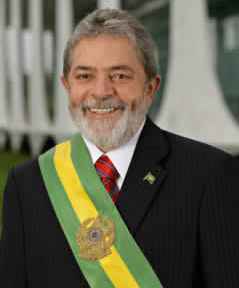- MENU
- HOME
- SEARCH
- WORLD
- MAIN
- AFRICA
- ASIA
- BALKANS
- EUROPE
- LATIN AMERICA
- MIDDLE EAST
- United Kingdom
- United States
- Argentina
- Australia
- Austria
- Benelux
- Brazil
- Canada
- China
- France
- Germany
- Greece
- Hungary
- India
- Indonesia
- Ireland
- Israel
- Italy
- Japan
- Korea
- Mexico
- New Zealand
- Pakistan
- Philippines
- Poland
- Russia
- South Africa
- Spain
- Taiwan
- Turkey
- USA
- BUSINESS
- WEALTH
- STOCKS
- TECH
- HEALTH
- LIFESTYLE
- ENTERTAINMENT
- SPORTS
- RSS
- iHaveNet.com
Brazil Stretching Clout to Central America
Andres Oppenheimer

Brazilian President Luiz Inácio Lula da Silva's largely unnoticed trip to Central America last week underscored an interesting phenomenon: Brazil is making big inroads into a region that was traditionally seen as Mexico's backyard.
The trend, brought to my attention in a story Thursday at the website www.infolaewtam.com, is further evidence of Brazil's growing emergence as Latin America's regional leader over the past decade.
Despite being Latin America's biggest and most populous country, Brazil had long been a sleeping giant that didn't want to get too close to its neighbors, nor get involved in the region's messy political conflicts. Many in the region jokingly called Brazil a "vegetarian dinosaur."
But since the late 90s, when Brazil got its economic house in order, Brazil has gradually increased its role as a political and economic leader in the region.
In 2000, Brazil launched the South American summits, which automatically excluded Mexico and left Brazil as the undisputed regional leader. In 2008, Brazil took that group a step further by creating the union of South American Nations (UNASUR) and hosting the first Latin American and Caribbean summit, the first such meeting without the presence of the United States.
Now, Brazil is setting its eyes on Central America.
Lula da Silva's trip to El Salvador, Guatemala and Costa Rica -- while the region's attention was focused on the Organization of American States' meeting in neighboring Honduras to lift Cuba's OAS suspension -- was the third visit by the Brazilian president to Central America in 13 months.
Lula da Silva's visit to El Salvador was the first ever by a Brazilian president.
Over the past year, Brazil has joined the Central American Integration System (SICA) -- the Central American governments' economic bloc -- as a "regional observer" state, and has said it plans to join the Central American Economic Integration Bank as an extra-regional partner.
Brazil is also leading negotiations to sign a preferential trade agreement between Central America and MERCOSUR, the South America's economic bloc made up of Brazil, Argentina, Uruguay and Paraguay. In addition, Brazil has stepped up technical assistance to help Guatemala set up poverty reduction programs, has given soft loans to Guatemala to buy six Brazilian-made "Supertucano" aircraft and radars and has started an experimental ethanol plant in El Salvador.
Marisol Argueta, who was El Salvador's foreign minister until Monday, told me in a telephone interview that while Brazil has taken up a more active role throughout Latin America "nowhere is that more visible than in Central America because until two years ago our relations with Brazil were almost nonexistent."
While Mexico -- and, increasingly, Venezuela -- are the biggest Latin American economic partners of Central America, Brazil's role is growing. Central America's two-way trade with Mexico was $4.4 billion last year, while trade with Brazil was $.2 billion.
But Brazil's most important inroads in Central America may be political, especially as a counterweight to Venezuela's efforts to prop up radical leftist groups in the region.
El Salvador's new leftist President Mauricio Funes, whose wife is Brazilian and a former activist with Lula da Silva's Worker's Party, said that "my two models will be Barack Obama . . . and my personal friend Lula da Silva."
While the Brazilian president attended Funes' inauguration ceremony, Venezuelan President Hugo Chávez -- who had given financial aid to Funes' backers through subsidized oil sales -- was notably absent. Chávez later said he stayed at home because of security concerns.
"Brazil is being welcomed in Central America as a strategic and ideological ally," said Manuel Orozco, a Central America expert with the Washington D.C.-based Inter-American Dialogue think tank. "Lula represents a political balancing point that many Central American leaders are seeking to reach internally."
My Opinion:
The good news is that Brazil's growing presence in Central America will help offset Chávez's petro-dollar diplomacy in the region.
The bad news is that Brazil's foreign policy is totally self-serving and has shown little interest in defending human rights or abiding by regional commitments for the collective defense of democracy.
If, instead of publicly praising Chávez and Cuba's dictatorship while quietly negotiating a growing presence of Brazilian companies in those countries, Lula da Silva would at least abstain from giving moral support to authoritarian rulers, he would do a great favor to Brazil -- and to the rest of the region.
WORLD | AFRICA | ASIA | EUROPE | LATIN AMERICA | MIDDLE EAST | UNITED STATES
©, The Miami Herald Distributed By Tribune Media Services